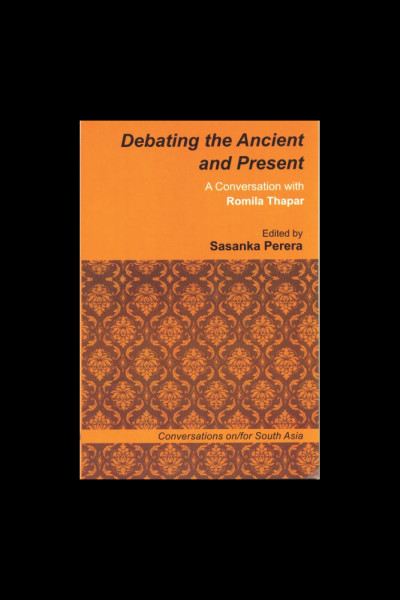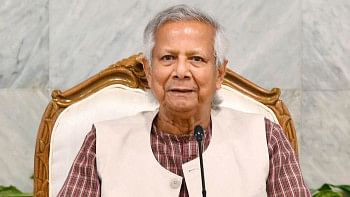Debating the Ancient and Present: A Conversation with Romila Thapar, Edited by Sasanka Perera

THE 'Past' decides the 'Present' in India. The past is an everyday word, in politics, academics, culture and science in India. The 'Present' questions of the 'Past' are often seen as ideological constructions. What is the past? Can we think of the Past and the Present in a dialogical way? Can they talk with each other? How do we think about the Past in the Present? These are some of the everyday questions Indians often deal with. It is in this context that the book edited by Sasanka Perera, speaks to the readers: How do you think about the past in contemporary India? This book is an outcome of a unique conversation with Prof. Romila Thapar held at the Dept. of Sociology, South Asian University, New Delhi. The University itself was set up in New Delhi in 2010 by SAARC. It is important to note that a discussion on the past is held at a department of sociology, and it is also important to highlight the fact that the department is concerned with the 'past', which many conventional sociology departments dare not deal with. This conversation with Prof. Thapar held on August 22, 2013, was chaired and moderated by Prof. Rustom Bharucha of Jawaharlal Nehru University. Members from the audience asked questions based on the writings of Prof. Thapar, which ranged from the methodology of studying the past to the controversies of studying the past. The book, Debating the Ancient and Present: A Conversation with Romila Thapar is the first instalment in the publication series, 'Conversations on/for South Asia' launched by the Department of Sociology at South Asian University in 2015.
The book is presented in a dialogical manner presenting some of the significant questions we face today, especially on the nature of historical writing. Most of the questions posed to Prof. Thapar by the audience were on the representation of the past in the present. Thapar's responses to these questions might not be new to historians, as they are aware of her other sophisticated writings on history.
However, the current political climate which derives its sustenance and legitimacy from the politicization of the past makes it important for scholars and historians to critically engage with the past, rather than let political ideologues be the sole custodians of the past. She makes it clear in many of her responses that history as an academic discipline should not be compared with general opinions, and it is the trained historians who have the responsibility to write history and decide the constitution of evidence. As she puts, "Historians are responsible for the interpretations because they're the ones who're interpreting it. The evidence doesn't speak by itself. The historian has to make the evidence speak and so what one's listening to is the historian making the evidence speak" (p.58). This should not be seen as a dogmatic treatment of history, as we live in a time where people with no understanding of history comments on historical events and try to communalise the past with their versions of history. It can also be seen as the anxiety of a committed historian at a time when the past gets distorted by rightwing ideologues. At a time when rightwing ideologues attempt to impose their own version of history and any serious historical writing is abusively labeled as 'Marxist', it is important to think with Thapar about the future of historical writing in India. Thapar's discussion on how various myths being 'represented' as history is significant as it conveys the message that one should be very careful of communally charged opinions of the past. The discussion on the Somanatha temple in this context is interesting.
The book discusses very important questions such as the challenges historians face especially when the state interferes in the writing of history. It directly speaks to the public about the dangers of distorted history - and the need for understanding the past without politicizing it. It speaks to the public the significance of opposing propagandist history, and encourages them to read and engage with histories written by professionals. This little book on the 'Past' is useful not only to students of history, but to anyone who wants to understand history unclouded by emotions. Though Thapar speaks in the context of understanding the Indian past in the present, much of what she has to say is of relevance to all attempts at dealing with the past in South Asia and beyond.
We should have more of these conversations and interactions, and it should be published widely for the larger audience. The attempt by the Department of Sociology at South Asian University has to be congratulated, and one hopes that there would be more conversations of/on the Past.


 For all latest news, follow The Daily Star's Google News channel.
For all latest news, follow The Daily Star's Google News channel. 



Comments